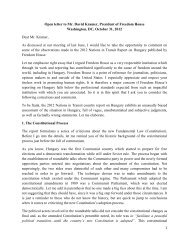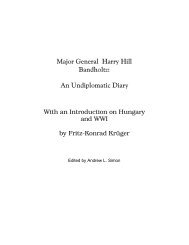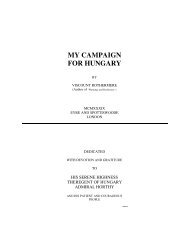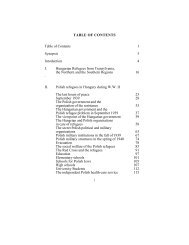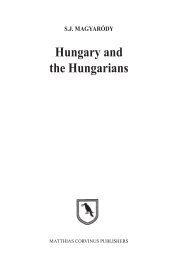The Fate of Western Hungary 1918-1921 - Corvinus Library ...
The Fate of Western Hungary 1918-1921 - Corvinus Library ...
The Fate of Western Hungary 1918-1921 - Corvinus Library ...
You also want an ePaper? Increase the reach of your titles
YUMPU automatically turns print PDFs into web optimized ePapers that Google loves.
Thus, it is clearly evident that the saving <strong>of</strong> Sopron is not attributable to the<br />
government but thanks to the local authorities, patriotic population and the<br />
resistance <strong>of</strong> the rebels! <strong>The</strong> government had no merit in the deed! And the<br />
responsibility for losing the rest <strong>of</strong> <strong>Western</strong> <strong>Hungary</strong> rests with it!” 449<br />
Further pro<strong>of</strong> from an extant document, according to which another ten<br />
Moson County villages (Barátudvar, Boldogasszony, Féltorony, Ilmic,<br />
Mosonbánfalva, Mosonszentandrás, Mosontarcsa, Mosontétény, Pomogy and<br />
Valla), mainly German populated, and six more in the vicinity <strong>of</strong> Sopron<br />
(Cinfalva, Fertőmeggyes, Kelénpatak, Somfalva, Sopronkeresztúr and Zárány),<br />
three German and three Croat speaking settlements, would also have been<br />
included in the plebiscite area. <strong>The</strong> latter six, similar to Kópháza, would almost<br />
certainly have voted to remain with <strong>Hungary</strong>. <strong>The</strong>y were excluded from the<br />
area covered by the plebiscite because, according to Ernő Träger, the Foreign<br />
Minister did not involve appropriate experts in drawing up the boundaries. 450<br />
Lajos Krug, a participant in the insurrection, bitterly remarked: “It is a firm<br />
fact that the first, unforgivable blunder was made by Foreign Minister Count<br />
Bánffy, when he made statements to the effect <strong>of</strong> being willing to give up parts<br />
<strong>of</strong> the territory <strong>of</strong> <strong>Western</strong> <strong>Hungary</strong>. First, Moson County came under the<br />
downward bidding, then slowly the energetic Hungarian stance shriveled to<br />
nothing! (…) the events <strong>of</strong> August [<strong>1921</strong>] completely overshadowed Count<br />
Bánffy until, finally, only the immediate surrounding area <strong>of</strong> Sopron was<br />
discussed behind the scenes.” 451<br />
A total <strong>of</strong> 24 Hungarian rebels and one gendarme lost their lives in the<br />
<strong>Western</strong> Hungarian insurrection between August 28 and November 4, <strong>1921</strong>.<br />
<strong>The</strong>y gave their lives for their country against the predatory, territory-hungry<br />
invading forces <strong>of</strong> Austrian, for land that was Hungarian for a thousand years,<br />
for the city <strong>of</strong> Sopron and the 18 settlements that were, ultimately, retained.<br />
<strong>The</strong>ir sacrifice was not in vain; they all deserve the eternal thanks <strong>of</strong> a grateful<br />
nation.<br />
Aside from those who fell in battle, commander Prónay had László Sátori,<br />
student <strong>of</strong> the Magyaróvár academy and reservist <strong>of</strong>ficer, Lt. Bakonyi and<br />
Cadet Bokor shot in Felsőpulya on September 13. 452 <strong>The</strong> latter two were<br />
executed by the commander for killing and robbing local Jews during the<br />
insurrection. In his memoirs, Prónay only remarks with contempt on one <strong>of</strong> his<br />
soldiers, a Jewish <strong>of</strong>ficer from his former White unit. Not for his origins but for<br />
his inhumane acts <strong>of</strong> reprisal. 453 Sátori and his associates were brought up in<br />
front <strong>of</strong> a court martial at the behest <strong>of</strong> Miklós Budaházy, commander <strong>of</strong> the 3 rd<br />
449<br />
Ibid, p. 17.<br />
450<br />
Fogarassy, László: A soproni népszavazás [<strong>The</strong> Sopron plebiscite]. In: Soproni<br />
Szemle, 1971, issue 4, pp 335-336.<br />
451<br />
Krug, 1930, op. cit., p. 30.<br />
452<br />
Missuray-Krúg, 1935, pp. 204–214.<br />
453<br />
Kovács, Tamás: Horthy és a zsidók. Sommás ítéletek, bonyolult valóság [Horthy and<br />
the Jews. Summary verdicts, complex reality.]. In: Nagy Magyarország, year II, issue 1,<br />
2010, February, pp. 77–78.<br />
177




